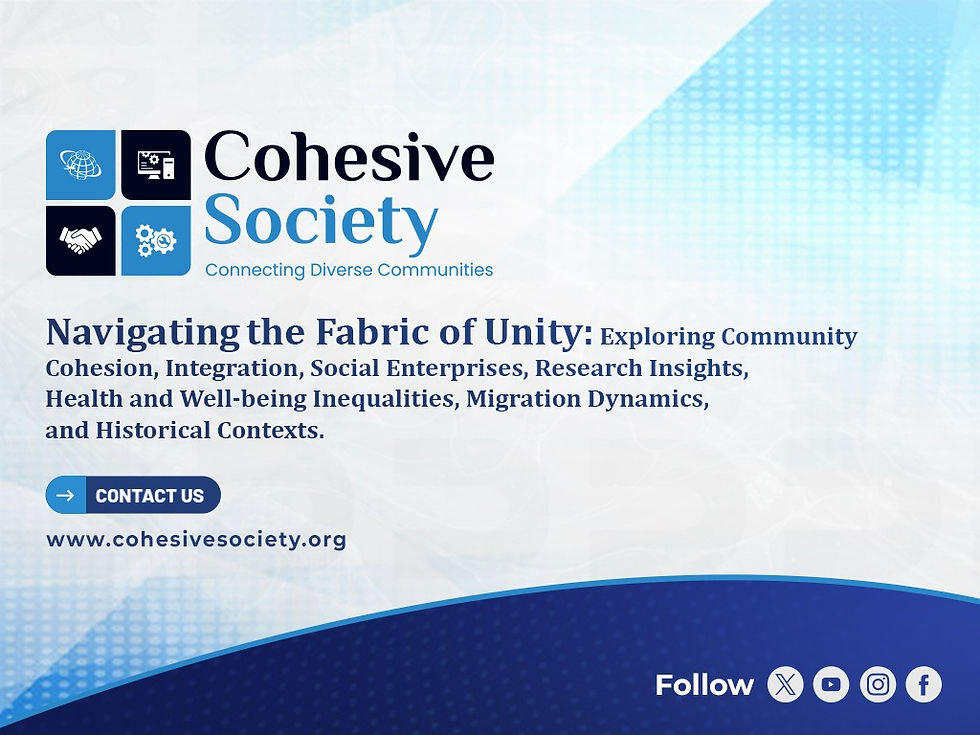Bridging the Language Gap: Empowering the UK's Bangladeshi Community
- Imran Chowdhury B.E.M

- Sep 28, 2023
- 4 min read
Updated: Mar 29, 2024

Introduction
he Bangladeshi community has long been a vibrant and integral part of the mosaic of cultures that make up the United Kingdom. However, a concerning issue has come to light through the Office of National Statistics 2021 census report: the English language speaking and listening rate among the Bangladeshi community is the lowest compared to other ethnic groups. This revelation underscores the pressing need to address this issue comprehensively, as it has far-reaching consequences on various aspects of their lives, including health, education, career opportunities, mental health, and integration. Cohesive Society CIC has advocated for change in this regard, shedding light on these challenges and offering potential solutions. In this blog, we will delve into the root causes of this issue and discuss the remedies required to build a more cohesive society.
The Challenge of English Proficiency
According to the 2021 census report, a significant portion of the UK's Bangladeshi community faces substantial barriers when it comes to English language proficiency. This challenge impacts every aspect of their lives, leading to health, education, and job opportunity disparities. For instance, language barriers can hinder effective communication with healthcare providers, resulting in subpar healthcare outcomes. In the long run, this contributes to poor health and oral health within the community.
Education and Career Opportunities
The language barrier also extends to education and employment opportunities. With a firm grasp of the English language, individuals from the Bangladeshi community may find it easier to access quality education and secure well-paying jobs. This, in turn, perpetuates a cycle of limited socioeconomic mobility, making it challenging for them to break free from poverty and achieve their full potential.
Mental Health Implications
The isolation resulting from language barriers can have severe mental health consequences. Limited English proficiency may lead to feelings of exclusion and alienation, exacerbating mental health issues such as depression and anxiety. A cohesive society thrives on the well-being of all its members, and addressing these mental health challenges is paramount.
Integration and Social Cohesion
One of the key tenets of a cohesive society is the inclusion and active participation of all its members. Language serves as the bridge that connects individuals from diverse backgrounds. When members of a community struggle with language, it can hinder their ability to engage fully in society, leading to social isolation. To truly embrace the vision of a cohesive society, we must work collectively to remove these barriers.
Cohesive Society CIC's Advocacy
Cohesive Society CIC has been working tirelessly to highlight the issues faced by the Bangladeshi community in the UK. They have been instrumental in shedding light on the challenges of limited English proficiency through research, advocacy, and community engagement. However, meaningful change requires awareness, adequate funding, and collaboration with authorities.
The Remedy: A Comprehensive Approach
Addressing the English language speaking and listening rate among the Bangladeshi community requires a multifaceted approach. Here are some critical steps that can help bridge the language gap:
Investment in Language Education: Adequate funding should be allocated to community-based English language programs tailored to the specific needs of the Bangladeshi community. These programs should be accessible and affordable, ensuring that individuals of all ages can enhance their language skills.
Healthcare Access: Efforts should be made to improve language support in healthcare settings, including training healthcare professionals in cultural competence and language assistance services.
Education and Employment Opportunities: Collaboration between educational institutions, employers, and community organisations can create pathways for individuals to access quality education and employment opportunities while addressing language barriers.
Mental Health Support: Mental health services should be culturally sensitive and accessible to the Bangladeshi community, acknowledging the unique challenges they face due to language barriers.
Community Engagement: Encourage community members to participate in initiatives to improve English language proficiency actively. Building a sense of belonging and community support is crucial.
Government Collaboration: Authorities must work with community organisations like the Cohesive Society CIC to develop and implement policies that effectively address these language disparities.
Conclusion
The findings of the Office of National Statistics 2021 census report regarding the English language speaking and listening rate within the UK's Bangladeshi community are a stark reminder of the work that remains to be done in creating a genuinely cohesive society. Cohesive Society CIC has been a driving force in advocating for change, but their efforts must be met with support from authorities and adequate funding to bring about meaningful change. By addressing language barriers comprehensively, we can empower the Bangladeshi community to lead healthier, more fulfilling lives and contribute fully to the diverse tapestry of the United Kingdom.
Bibliography:
Office for National Statistics. (2021). 2021 Census, Population and Household Estimates for England and Wales. Retrieved from https://www.ons.gov.uk/peoplepopulationandcommunity/populationandmigration/populationestimates/datasets/populationestimatesforukenglandandwalesscotlandandnorthernireland
Migration Observatory. (2020). Language and Integration in the UK: Policy Brief. Retrieved from https://migrationobservatory.ox.ac.uk/resources/briefings/language-and-integration-in-the-uk-policy-brief/
National Health Service (NHS). (2021). Access to Healthcare for People with Limited English Proficiency. Retrieved from https://www.england.nhs.uk/primary-care/primary-care-commissioning/living-well/extended-access/community-pharmacy/
Mind. (2020). Mental Health Support for Black, Asian and Minority Ethnic Communities. Retrieved from https://www.mind.org.uk/information-support/coronavirus/coronavirus-and-your-wellbeing/ethnicity-mental-health/
The Guardian. (2021). UK's Multiculturalism Should be Celebrated, but Addressing Integration Gaps is Crucial. Retrieved from https://www.theguardian.com/commentisfree/2021/feb/28/multiculturalism-integration-government-support-language-inclusive-communities



Comments